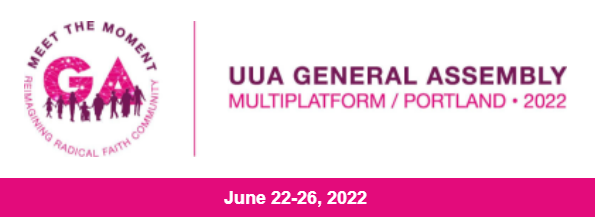
Ware Lecturer Dr. Ibram X. Kendi
Ibram X. Kendi is the author of five straight #1 New York Times bestsellers, including How to Be an Antiracist and the Award-winning National Book Stamped From The Beginning: A Definitive History of Racist Ideas in America.
Service of the Living Tradition
Honor fellowshipped and credentialed religious leaders, remember those who have died, recognize those who have completed active service, and welcome those who have received a fellowship or credentialed status in the past year. Our former Interns are often recognized during this service as they move through the various levels during their professional careers.
Daily Events
Worship Service
General Sessions (Reports, Resolutions, Actions of Immediate Witness, Bylaws)
Workshops
Evening Event (Special Programs/Services, Ware Lecture)
Special Attention to:
Article II Study Commission
Care Team
DRUUMM (Diverse and Revolutionary UU Multicultural Ministries) is a Unitarian Universalist People of Color Ministry and anti-racist collective bringing together lay members and religious professionals.
Gender-Neutral Restrooms
LBGTQ
Siding With Love
UU Animal Ministry
UU Buddhist Fellowship
UUs for Jewish Awareness
UUs for a Just Economic Community
UUJEC is a Unitarian Universalist network that encourages UUs and UU congregations to work for economic justice.
UU Ministry for Earth
UU Service Committee
One way to engage in Unitarian Universalist (UU) social justice work and further promote liberal religious values is to participate in the Unitarian Universalist Association (UUA) Social Witness process. Together, as congregations and at General Assembly, we articulate and adopt positions on social justice issues, using procedures outlined in the Bylaws and Rules and facilitated by the Commission on Social Witness.
Your congregation or district may initiate a Congregational Study/Action Issue, starting the process that leads to a Statement of Conscience. Your General Assembly (GA) delegates may initiate Actions of Immediate Witness. Additionally, all congregations are encouraged to participate in studying and acting upon that year’s chosen Congregational Study/Action Issue and Actions of Immediate Witness.
Congregational Study/Action Issues and Statements of Conscience
Every two years, the Commission on Social Witness (CSW) receives proposals from congregations and districts for Congregational Study/Action Issues (CSAIs), each hoping theirs will be selected and will eventually result in a UUA Statement of Conscience. The Study and Action Process was created to uphold our principles and to engage Unitarian Universalists in the articulation of conscience on pressing social justice issues. The process is initiated by congregations, districts, and two UUA-sponsored organizations and culminates with the delegates at General Assembly. The CSW facilitates transitions from one phase to the next.
After three years of study and action on a CSAI, the General Assembly delegates may adopt a Statement of Conscience (SOC) on the subject. It is the product of countless hours of thought, collaboration, and dedication. During the year following the adoption of a SOC, congregations and UUA staff will work to implement the SOC and report their results to the following General Assembly. Adopted Statements of Conscience serve to focus the efforts of congregations and other UU groups on the topic of the SOC, shape the meaning of contemporary Unitarian Universalism, and empower the Office of Advocacy and Witness to lobby our positions in pending legislation.
For more information about the social witness process at GA, please refer to the Commission on Social Witness or reference UUA Bylaws Section 4.12. UUA Statements of Conscience.
Actions of Immediate Witness
One of the most exciting aspects of the General Assembly is the unfolding Action of Immediate Witness (AIW) process. People come with a wide range of issues, engage one another in conversation, sign petitions, debate the issues, vote, and bring to life the Principles of Unitarian Universalism, all within the span of one General Assembly.
Unlike a Statement of Conscience, an AIW does not carry the full authority of the Unitarian Universalist Association; rather, it expresses the conscience of the delegates at the GA at which it is passed. This difference follows from the difference in procedure: Congregational Study/Action Issues are initiated by congregations or districts or specified UUA-sponsored organizations and move through a three-year period of study and action with opportunities for congregational and district comment. There are no such opportunities for AIWs, which are initiated by individuals and move through their entire creation and adoption process during one GA. Nonetheless, AIWs are also the product of considerable thought, collaboration, and commitment.
The AIW process allows Unitarian Universalists to respond quickly to social issues deemed urgent. Adopted AIWs are used by congregations in local efforts and empower the Washington Office for Advocacy to take action and recommend action through other departments of the UUA and other UU groups.
